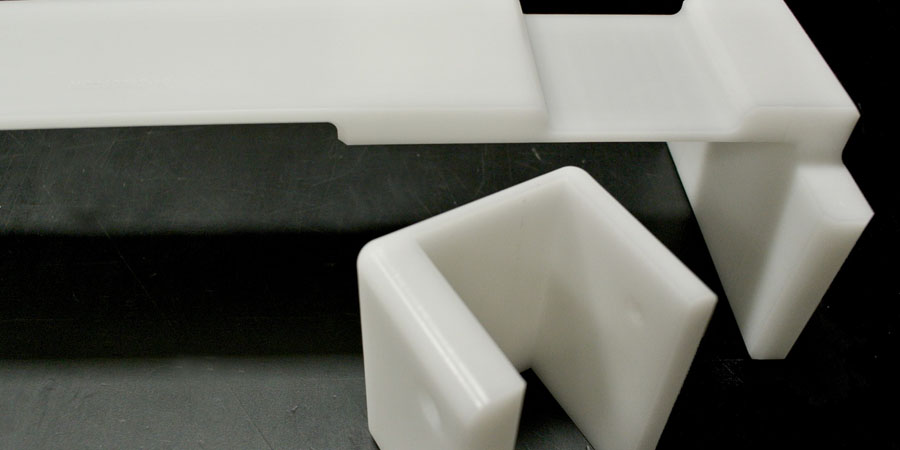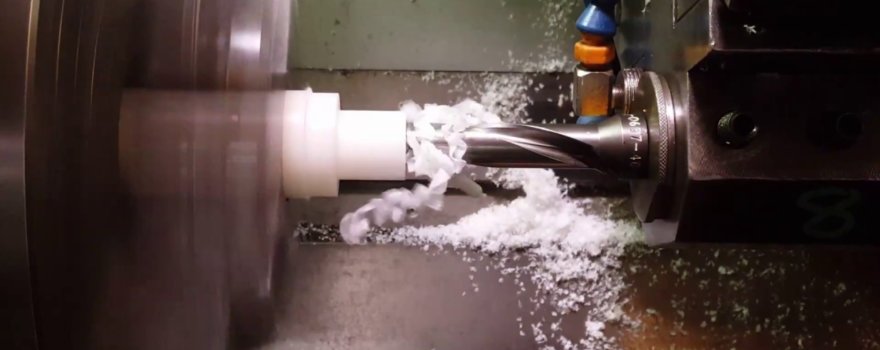When working with us, you can choose from hundreds of manufacturing materials, including various grades of thermoplastics and metals. Although you can choose to provide your own materials for machining projects, most of our customers choose materials from the many options we provide. When choosing a material, please consider its performance, manufacturability, appearance and cost.
One of the most popular plastic material choices we offer for machining is Delrin acetal homopolymer (Polyoxymethylene POM).
Therefore, this article introduces the basic knowledge of Delrin machining: what is Delrin, the advantages and limitations of Delrin, the common applications of Delrin and the skills of designing and machining Delrin parts.
What Is Delrin?
Delrin is often referred to as acetal (polyoxymethylene) homopolymer. It has impact and wear resistant semi-crystalline thermoplastics. Delrin plastic is popular in a wide range of machining applications and is an ideal material for parts designed to replace metal.
It has a density of 1.410–1.420 g/cm3 and is rigid at a temperature of -40°C. Its crystallinity is 75-85% and its melting point is 175°C.
The world’s leading companies use Delrin for high-load mechanical applications, such as gears, safety restraints, door systems, conveyor belts, healthcare delivery devices, and other demanding products and parts. It combines low friction and high wear resistance with the high strength and stiffness required for such applications. Although Delrin is opaque in nature, it can provide all colors. Delrin also works well with metals and other polymers, and provides excellent dimensional stability in high-precision machining.

Advantages Of Delrin
Due to its material properties and processability, Delrin is a popular engineering thermoplastic used for CNC machining. Its main advantages are:
Low Moisture Absorption:
Delrin can operate in a humid environment with little impact on performance or size. It is chemically resistant to hydrocarbons, solvents and neutral chemicals.
Good Abrasion Resistance
With a low coefficient of friction and a hard and elastic surface, Delrin is the material of choice for many wear applications.
Machinability:
Delrin is an easy-to-cut plastic with excellent dimensional stability. This makes it easy to cut to tight tolerances.
Strength, Toughness And Impact Resistance:
Delrin is a tough, high-strength material suitable for demanding applications.
Moisture And Chemical Resistance:
Delrin is resistant to solvents, gasoline, alcohol and other chemicals, as well as moisture resistance.
Creep Resistance:
Delrin has good creep resistance, making it suitable for long-life end products such as auto parts. It also has good fatigue resistance.
Electrical Insulator:
Delrin is a popular processing material in consumer electronic products due to its electrical insulating properties.
Natural Lubricity:
Delrin has high natural lubricity, so it is a good choice for low friction applications where parts will come into contact with other plastic parts.
The combination of these excellent mechanical properties in a single material can achieve thinner, lighter parts and shorter molding cycles, and may reduce costs.
Limitations Of Machining Delrin
Delrin machining has some limitations that make it unsuitable for certain parts and applications. Its main limitations and weaknesses are:
Adhesion:
Due to the chemical resistance of Delrin, it does not respond well to adhesives and is difficult to bond-although Delrin is easier to bond than POM copolymers.
Flammability:
Delrin will not self-extinguish, it will burn until the oxygen is eliminated. Need to use Class A fire extinguisher to extinguish the fire.
Heat Sensitivity:
Machining Delrin at too high temperature will cause deformation. Although this is manageable, it does require attention.
Delrin Application
From the automotive industry to consumer electronics, machined Delrin parts can be found everywhere. Some common processing applications of Delrin include:
Delrin mechanical parts can include gears, housings, springs, fan wheels, valves, bearings, rollers and scrapers.
Delrin parts for electronic applications include insulators, connectors, spools, connectors, and consumer electronic parts such as keyboard covers.
Delrin automotive components include door lock system, hinged housing and fuel transmitter unit.
Delrin medical components include inhalers, insulin pens and medical instruments. Includes guitar pick (left) and surgical stapler (right).

Delrin Machining Tips
Delrin is widely regarded as one of the easiest plastics to process, so no severe precautions are required. That being said, it responds better to certain design considerations and processing methods than others.
Designed For Delrin:
When designing parts for Delrin machining, try to keep the wall thickness consistent and include fillets and ribs if necessary. Large parts may warp more easily.
Keep Cool:
Delrin is sensitive to temperatures above 121°C. The performance of air-based coolant is better than that of liquid coolant, and it can also speed up the removal of chips.
Keep tools clean:
Although the processed Delrin produces consistent and manageable chips, the chips should be removed quickly to avoid buildup of stickies on the tool.
Cutting Tools:
To avoid contamination, it is best to use cutting tools that have never been used to cut aluminum or other metals before.
Sharpness:
When machining Delrin, a sharp cutting tool with a large clearance angle will provide better results, and the use of cutting lubricants may also help.
Not Too Tight:
Delrin is not particularly stiff, so you should be extra careful during work. A slight clamping force should always be used.
Reasons For Choosing SANS Machining:
- ISO 9001: 2015 Quality Assurance
- Consistent high-quality machined parts
- Reliable delivery date
- Excellent customer service and communication
- Machining design recommendations
- Rich experience in machining


